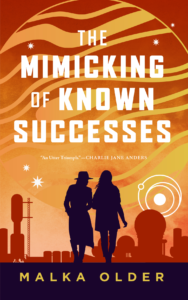
I’ve been vaguely familiar with Malka Older as a sci-fi author with a pretty good reputation, but I hadn’t actually had an opportunity to read any of her work, and when The Mimicking of Known Successes was pitched as a sapphic Sherlock Holmes in space, my mystery-fatigue inclined me to skip this one as well. But when it generated enough hype to make the Hugo shortlist for Best Novella, it was time to circle back and see what the fuss was about.
The Mimicking of Known Successes opens with a missing person—presumed by most everyone but the lead investigator to be a suicide on an out-of-the-way rail station on humanity’s Jupiter colony. The investigator, not being convinced, reaches out to an old flame, the story’s first-person narrator, to help provide context to an investigation that seems to intimately involve the academy where the lead now teaches. Investigations and reconnections ensue.
While the investigator’s single-minded focus certainly calls to mind a Holmes to the narrator’s Watson, and the Jovian setting cleverly limits communication and transportation technology in such a way that it has echos of a period piece, the story is very much not the whodunnit that I had been led to expect. Whodunnits require both clues and suspects to be on full display to the audience, who is then challenged to race the investigator to identify the culprit. But The Mimicking of Known Successes makes no particular secret about the identity of the person at the center of everything, and the list of potential collaborators is generally opaque. As a whodunnit, it would be a miserable failure.
But that isn’t to say that there is no intriguing mystery here. But instead of the identity of the culprit, the mystery is centered around the why. What motivated the disappeared man traveling to such a remote station in the first place. How did his disappearance benefit anyone? And addressing this mystery requires diving into university politics, primarily the squabbles over research avenues that will eventually lead to the deterring and resettlement of a poisoned Earth.
To me, those philosophical conflicts were the most intriguing aspect of the novella, and could’ve stood to be an even bigger part than they were. Because not only are there practical disagreements about how to make Earth livable, there are fundamental conflicts about what getting it right even looks like. This makes perfect sense in a story where the cast doesn’t even have firsthand memory of Earth and where the majority of their academic research is dedicated to finding a way back, and it’s a fascinating philosophical debate regardless of the mystery plot. Unfortunately, the novella form allowed the space to sketch this conflict as background motivation, but The Mimicking of Known Successes ultimately had different aims.
Because the story is just as much about the central relationship as it is the mystery. The main characters had had a romance in their university days—undone by the investigator’s single-mindedness—but had gone years without seeing each other, and working together to solve a mystery brings back a flood of memories and emotions. Despite the novella length, it’s a slow build, and I was entering the last quarter before I really began to see a romance plot as opposed to a rekindled friendship with some light pining.
But the slow build works, because the narrator has plenty of reasons to believe the relationship won’t, and needs time to convince herself otherwise. I’m not sure that in the end she convinced me that they had something that would last, but she had convinced me that she had convinced herself, which isn’t quite the same but still provides some narrative satisfaction. I did struggle to distinguish between the voices of the two main characters, which probably hurt the effectiveness of the romantic plot, but seeing the narrator’s evolving perspective served as a reasonable consolation prize.
Overall, The Mimicking of Known Successes does a lot well—building a pseudo-period world, generating a compelling philosophical conflict, moving the narrator on a quality internal arc—though nothing so wonderfully that I necessarily understand its place on a Best Novella shortlist. A more compelling mystery or more distinct voices for the two lead characters would’ve made the whole package stronger, but it’s still a quick change-of-pace read that should appeal to fans of cozy trappings and sapphic subplots.
Recommended if you like: faux-period pieces, sapphic pining, tea and biscuits (consumed by someone other than you)
Can I use it for Bingo? It’s a Book Club book and also is written by an Author of Color, is First in a Series, and contains a Prologue or Epilogue.
Overall rating: 14 of Tar Vol’s 20. Four stars on Goodreads.
